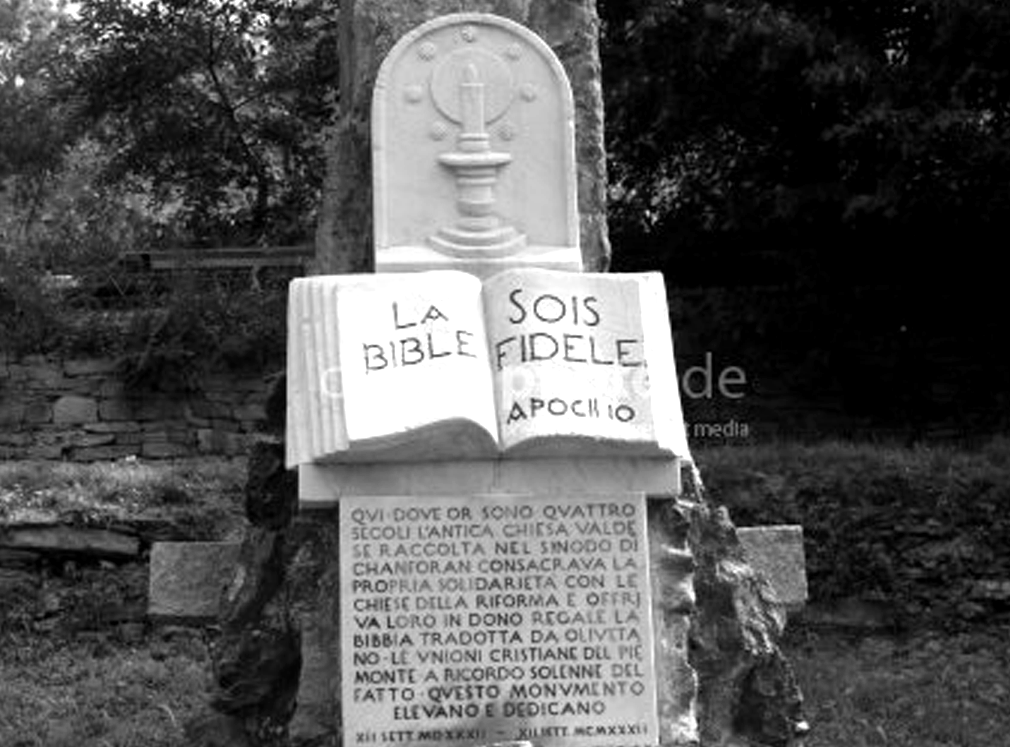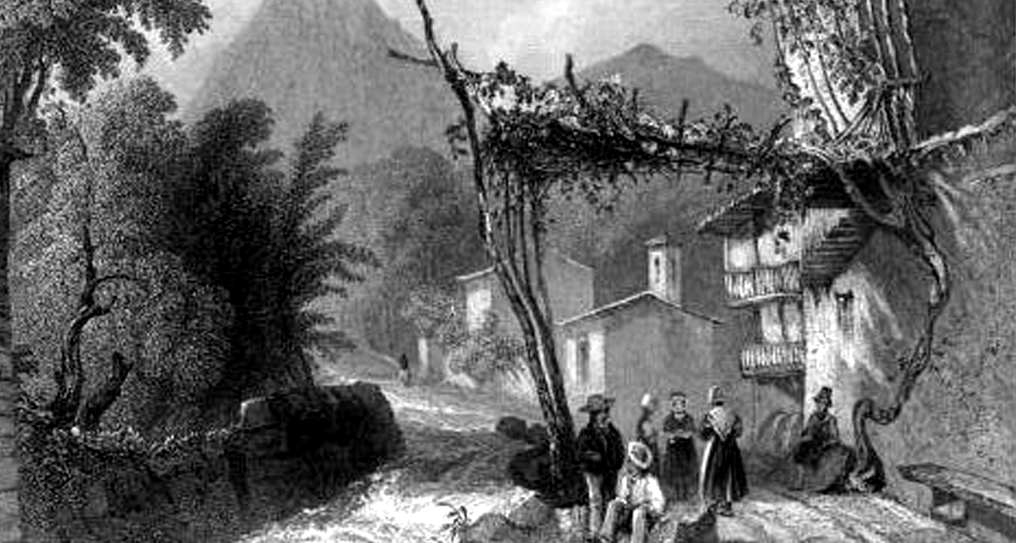Why Waldo? (Continued and concluded from February, 2011)
Peter Waldo lived during the period of Thyatira, during the depths of Papal authority. The Catholic Church partnered with governments to rule with a heavy hand. This partnership is referred to in Revelation 2:20-23.
“Notwithstanding I have a few things against thee, because thou sufferest that woman Jezebel, which calleth herself a prophetess, to teach and to seduce my servants to commit fornication, and to eat things sacrificed unto idols. And I gave her space to repent of her fornication; and she repented not. Behold, I will cast her into a bed, and them that commit adultery with her into great tribulation, except they repent of their deeds. And I will kill her children with death; and all the churches shall know that I am he which searcheth the reins and hearts: and I will give unto every one of you according to your works.”
Jezebel, the Baal worshiping Queen, and her husband wicked King Ahab, are types. It was she who protected the priests of Baal and persecuted Elijah using the secular power of her husband, so that Elijah had to flee to the wilderness for 3½ years. Similarly, during the fourth stage of the church, the Roman Catholic Church, abetted by the kings of Europe, persecuted the true church, which was compelled to dwell in the wilderness. The Waldenses did their witnessing in secret as they fled from place to place to avoid persecution.
In Jesus’ message to this period of the church in Revelation, Jesus commended the brethren for their love, faith, service and patient endurance. However, he also warned, “But I have a few things against thee, because thou hast there them that hold the doctrine of Balaam, who taught Balac to cast a stumbling block before the children of Israel, to eat things sacrificed unto idols, and to commit fornication. So hast thou also them that hold the doctrine of the Nicolaitanes, which thing I hate” (Revelation 2:14). But even in this criticism, Jesus showed compassion and understanding, for the brethren of this period were up against an evil and powerful system.
For example, to the first stage, Ephesus, Jesus said “I have somewhat against thee,” and then said they must repent in order to remain faithful, “or else I will come unto thee and will remove thy candlestick out of his place” (Revelation 2:4, 5). He says something similar to the third stage, Pergamos (Revelation 2:14-16). But to Thyatira he is gentler. “I will put upon you none other burden. But that which ye have already, hold fast, till I come” (Revelation 2:24, 25). Jesus did not command the brethren to face certain death by openly challenging Papacy and the governments of Christendom. Like Elijah, they were allowed to flee to the wilderness where they were cared for by the Lord’s providence.
In 1227, when the Inquisition officially began under Papal control, there were some 150 heretical sects in the western portion of the Empire. Many of these were considered harmless, but some others who had begun as a protest against the rich, and in particular the rich clergy, posed a real threat to the church’s authority to maintain unity in Christendom. Thus the purpose of the Papal Inquisition in Western Europe was to stamp out heresy and restore orthodoxy.
 Monument at Chanforan – Waldenses ministers met with reformers in Switzerland and Germany, and after careful deliberation, joined the Reformation. In 1532, thousands of ministers and laymen met with prominent reformers at Chanforan, the Waldensian Church embraced the Reformation, and secrecy was abandoned.
Monument at Chanforan – Waldenses ministers met with reformers in Switzerland and Germany, and after careful deliberation, joined the Reformation. In 1532, thousands of ministers and laymen met with prominent reformers at Chanforan, the Waldensian Church embraced the Reformation, and secrecy was abandoned.
Unfortunately, it pretty much succeeded. Other than a few scattered zealots, heretical sects were all but wiped out. Of all the many medieval sects that existed in the Middle Ages, only the Waldenses survived to today as an organized religious body. Their church is headquartered mainly in Italy, where they are about 20,000 strong right under the nose of the Papacy.
TO PAPACY
In Revelation 2:21 Jesus said of Jezebel, “I gave her space to repent of her fornication and she repented not.” The word translated “space” in verse 21 is from the Greek word chronos, which means “a time.” In scripture, a symbolic time represents a 360-day year with each day representing a year. Thus the symbolic time Jezebel was given to repent was 360 years long.
This raises two questions: First, because she had so many faults, what specifically was Papacy supposed to repent from? Second, was the 360 year period in the past or the future relative to the time opening the fourth period of the Church?
The answer to the first question is found in the name Jezebel. This antitypical Jezebel had committed spiritual fornication with the state and used its power to persecute the saints, suppress the truth, and to teach abominable error. She needed to repent of this harlotry.
Regarding the second question, there are two ways we can apply the time to repent of this illicit church-state union. First, a past application. If the fourth stage of the church started in the year 1160, then 360 years prior to this, in the year 800, the Pope crowned Charlemagne, King of France. This “marriage” of church and state was the formal step in the forming of the Holy Roman Empire. According to this reckoning, the Lord allowed Jezebel 360 years, from 800 to 1160, to change and repent of her fornication. But she obviously had no intention of repenting, so Peter Waldo was sent to France, to the very land where this unholy alliance had its official beginning.
Next, a future application: If we add 360 years to 1160, it brings us to 1520, the year Martin Luther’s trial took place when 41 of his 95 proposals nailed to the church doors at Wittenburg were condemned as heretical. Luther himself was pronounced a heretic. This action ended all hope that she would repent or reform, and the Reformation began in earnest. There is merit in both applications.
Something similar may apply to the punishments warned of in Revelation 2:22, 23. “Behold, I will cast her into a bed, and them that commit adultery with her into great tribulation, except they repent of their deeds. And I will kill her children with death.” This great tribulation might be the 100 years war between France and England that exhausted them all, weakening church and state. Killing her children with death could be the Black Plague, perhaps the most widespread epidemic known to man. It began in Constantinople in 1334, and carried by the returning crusaders, spread to Europe and Asia. In less than 20 years it killed from one-third to as much as three-quarters of the population.
Or we might look at verses 22-23 as a long-range prophecy of the conclusion of the age and the great time of trouble and judgment upon Papacy. After her destruction, her children of the tare class will become dead to her and alive to the true king and the kingdom. Perhaps both applications are true, the prophetic primary and the literal secondary.
TO THE TRUE CHURCH
“But unto you I say, and unto the rest in Thyatira, as many as have not this doctrine, and which have not known the depths of Satan, as they speak; I will put upon you none other burden. But that which ye have already hold fast till I come. And he that overcometh, and keepeth my works unto the end, to him will I give power over the nations: And he shall rule them with a rod of iron; as the vessels of a potter shall they be broken to shivers: even as I received of my Father. And I will give him the morning star” (Revelation 2:24-28).
Here Jesus addresses the true church, and in particular the Waldenses. For this faithful remnant who did not bow the knee to Baal, or Jezebel’s spiritual fornication with the political powers, it was burden enough that they were driven literally and symbolically into the wilderness and suffered as heretics during the heart of the inquisition. If they would remain faithful in this test of endurance under such trying circumstances, no other burden would be necessary to prove their love and loyalty.
During the Thyatira stage, Papacy was at the height of her power and glory. She claimed that Christ’s Kingdom reign had begun through his vicegerent the pope. This Jezebel literally did have authority over nations, and she ruled with a rod of iron, dashing whoever opposed her.
 Waldensian Church at Bobbio Pellice (from “The Waldenses,” William Beattie, 1838). “1848 … Waldenses in Italy had 18 ministers and 15 congregations … the number … about 13,000” (New Schaff-Herzog Enc. of Religious Knowledge, “Italy, the Reformation in,” page 66).
Waldensian Church at Bobbio Pellice (from “The Waldenses,” William Beattie, 1838). “1848 … Waldenses in Italy had 18 ministers and 15 congregations … the number … about 13,000” (New Schaff-Herzog Enc. of Religious Knowledge, “Italy, the Reformation in,” page 66).
How comforting, then, the promise that overcomers during this period reign with Christ as the true judges and kings in the coming kingdom.
Verse 28: “And I will give him the morning star.” Jesus is himself the morning star, the sun of righteousness who will arise with healing in his wings to bless all the families of the earth. (Malachi 4:2). To those brethren dwelling in the midst of the Dark Ages, Jesus offering himself as the morning star, as a symbol of hope and of good things to come, would have such special meaning. The reward for enduring under such persecution would be to share Jesus’ personal fellowship and glory.
Verse 29: “He that hath an ear, let him hear what the Spirit saith unto the churches.” The promises to the church of Thyatira are not confined to them only, for the spirit saith it to all the churches. God has given us the sure word of prophecy, whereunto we do well that we take heed – so that we watch and learn from the experiences of all the churches and hold fast that which we have till the end.
– Br. Jerry Monette
